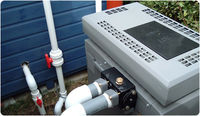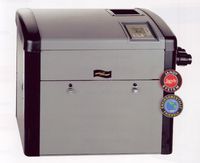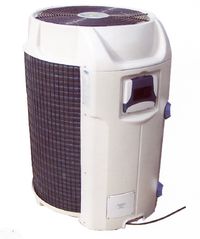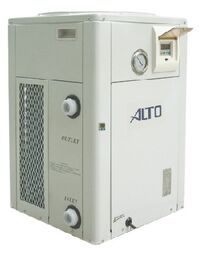Heating Options
Gas Swimming Pool Heaters
Gas-fired pool heaters are one of the most popular systems for heating swimming pools. Today you can find new gas-fired heater models with much higher efficiencies than older models. However, depending on your climate and pool use, they may not be the most energy-efficient option when compared to the latest heat pumps and solar pool heaters.
How They Work
Gas pool heaters use either natural gas or propane. As the pump circulates the pool's water, the water drawn from the pool passes through a filter and then to the heater. The gas burns in the heater's combustion chamber, generating heat that transfers to the water that's returned to the pool.
They are most efficient when heating pools for short periods of time, and they are ideal for quickly heating pools with relatively small gallonages. Therefore, gas pool heaters can be a good choice for pools that aren't used on a regular basis. Unlike heat pump and solar pool heaters, gas pool heaters can maintain a desired temperature regardless of the weather or climate.
Selecting a Gas Pool Heater.
When selecting a gas swimming pool heater, you need to consider the following:
Sizing a Gas or Heat Pump Swimming Pool Heater
Sizing a gas or a heat pump pool heater involves many factors. Basically, a heater is sized according to the surface area of the pool, the gallonage of the pool and the difference between the pool water temperature and the average air temperature. Other factors also affect the heating load for outdoor pools, such as wind exposure, humidity levels, and cool night temperatures. Therefore, pools located in areas with higher average wind speeds at the pool surface, lower humidity, and cool nights will require a larger heater.
Gas pool heaters are rated by Btu (British thermal unit) output. Outputs range from 75,000 Btu to 450,000 Btu.
Heat pump pool heaters are rated by Btu output and kilowatts. Standard sizes include 9kW/30,000 Btu, 15kW/50,000 Btu, 23kW/80,000 Btu and 30kW/100,000Btu
Calculating Approximate Size
To calculate an approximate heater size for an outdoor swimming pool, follow these steps:
1.Determine your desired swimming pool temperature.
2.Determine the average temperature for the coldest month of pool use.
3.Subtract the average temperature for the coldest month from the desired pool temperature. This will give you the temperature rise needed.
4.Calculate the pool surface area in square feet.
5. Calculate the pool gallonage.
Installation and Maintenance
Proper installation and maintenance of your gas pool heater can optimize its efficiency. It is a legal requirement in the UK for a Corgi registered engineer to install gas heaters and even perform complicated maintenance or repair tasks.
Read your owner's manual for a maintenance schedule and/or recommendations. You'll probably need to tune up your pool heater annually. Also, scaling in the burner or heat exchanger may decrease efficiency over a period of time.
With proper installation and maintenance, gas pool heaters typically last five or more years.
Heat Pump Swimming Pool Heaters
If you want the most energy-efficient way to heat your swimming pool, consider using a heat pump pool heater.
How They Work
Heat pumps use electricity to capture heat and move it from one place to another. They don't generate heat.
As the pool pump circulates the swimming pool's water, the water drawn from the pool passes through a filter and the heat pump heater. Heat pumps have a fan that draws in the outside air and directs it over the evaporator coil. Liquid refrigerant within the evaporator coil absorbs the heat from the outside air and becomes a gas. The warm gas in the coil then passes through the compressor. The compressor increases the heat, creating a very hot gas that then passes through the condenser. The condenser transfers the heat from the hot gas to the cooler pool water circulating through the heater. The heated water then returns to the pool. The hot gas, as it flows through the condenser coil, returns to liquid form and back to the evaporator, where the whole process begins again.
An illustration showing how a heat pump operates.
Example of how a heat pump operates
Higher efficiency heat pump pool heaters usually use scroll compressors versus the reciprocal compressors of standard units.
Heat pump pool heaters now work efficiently with the ambient air temperature as low as 0 degrees C . The cooler the outside air they draw in, the more energy they use. However, since most people use outdoor swimming pools during warm and mild weather, this usually isn't an issue.
Selecting a Heat Pump Pool Heater
Heat pump pool heaters no longer cost more than gas pool heaters, and they typically have much lower annual operating costs because of their higher efficiencies. With proper maintenance, heat pump pool heaters typically last longer than gas pool heaters. Therefore, you'll save more money in the long run.
When selecting a heat pump pool heater, you should consider its:
* Size
* Efficiency
* Costs.
Installation and Maintenance
Proper installation and maintenance of your heat pump pool heater can optimize its efficiency. It's best to have a qualified electrician install the heater as it is a legal requirement in the UK for all electrical installations to be certificated.
Read your owner's manual for a maintenance schedule and/or recommendations. You'll probably need to tune up your pool heater annually. Because of a heat pump pool heater's many moving and electrical parts, it will probably require periodic service by an air conditioning technician.
With proper installation and maintenance, heat pump pool heaters can last 10 or more years.
More information on Electric Pool Heaters, Oil Fired Pool Heaters and Solar Panels will be published shortly.




